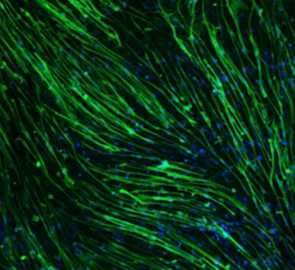
rPeptide是美国一家生物化学研发公司,主要产品涉及领域为老年性痴呆症与帕金森综合症研究使用的重组蛋白,重组多肽,抗体以及试剂等等,另外还提供一系列外包服务,从分子生物学,蛋白表达与蛋白纯化到13C与15N 统一标记蛋白与多肽。同时, rPeptide 技术平台可解决可溶性多肽/蛋白(例如:β-淀粉样蛋白、廋蛋白、前胰岛素)在大肠杆菌中表达等历史性难题。
以下是该公司部分代表产品:
Antibodies(抗体)
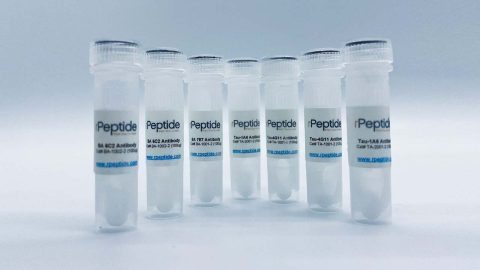
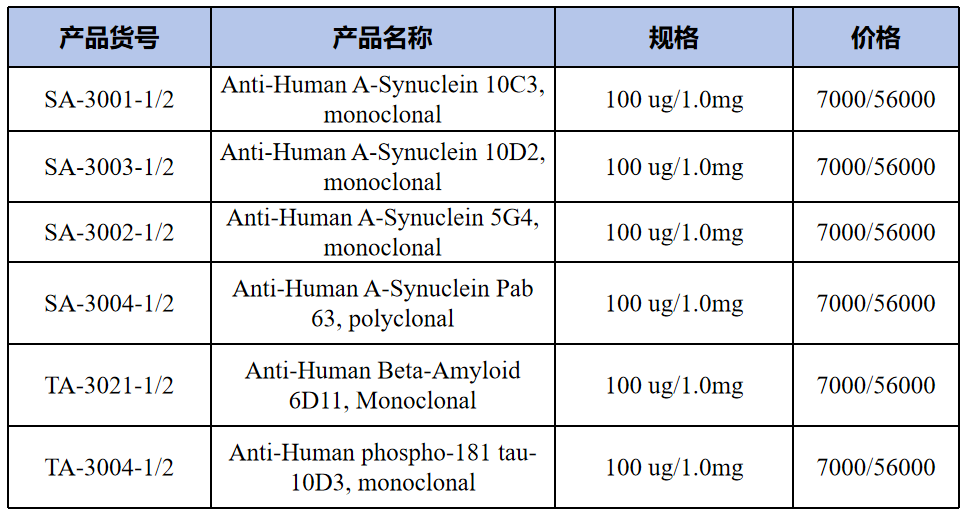
Peptides(多肽类)
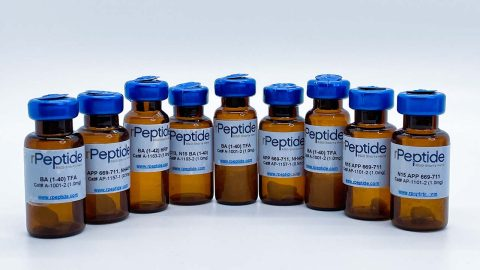

Proteins(蛋白质)
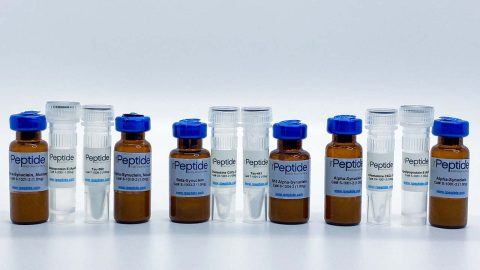
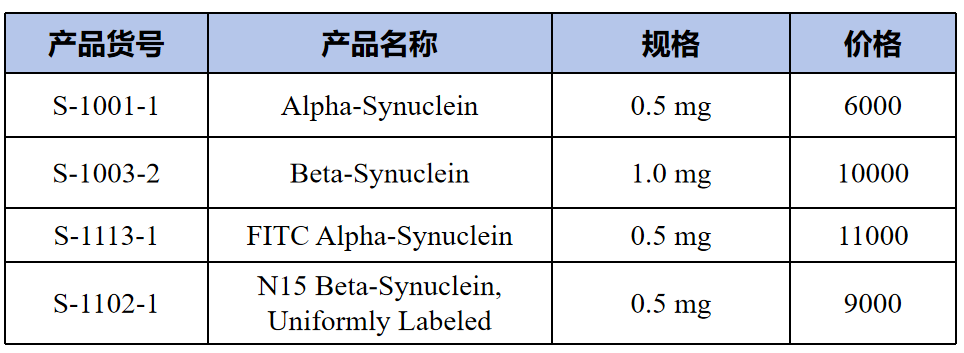
Neurodegenerative related compounds(神经退行性相关化合物)
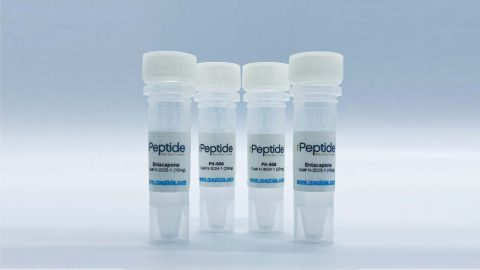
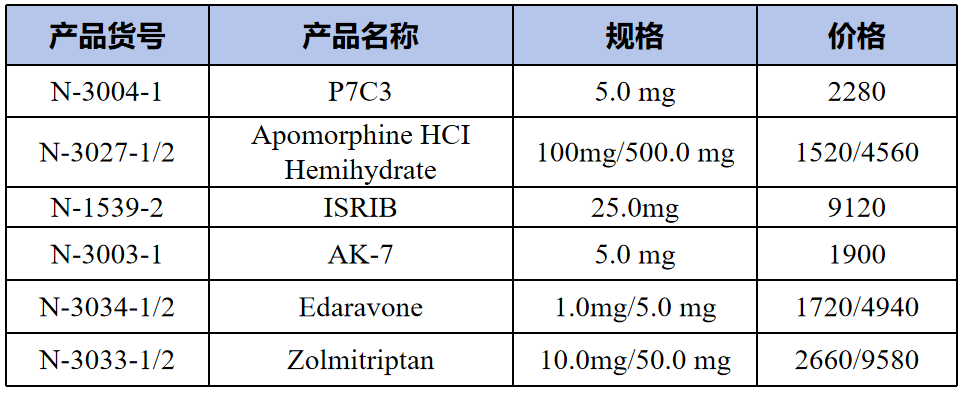
Coronavirus research tools(冠状病毒研究工具)
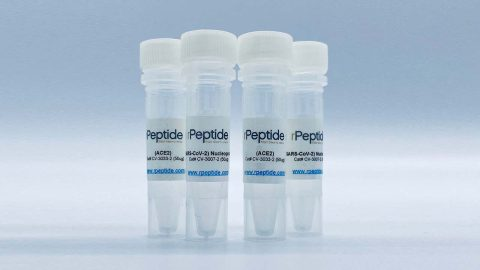
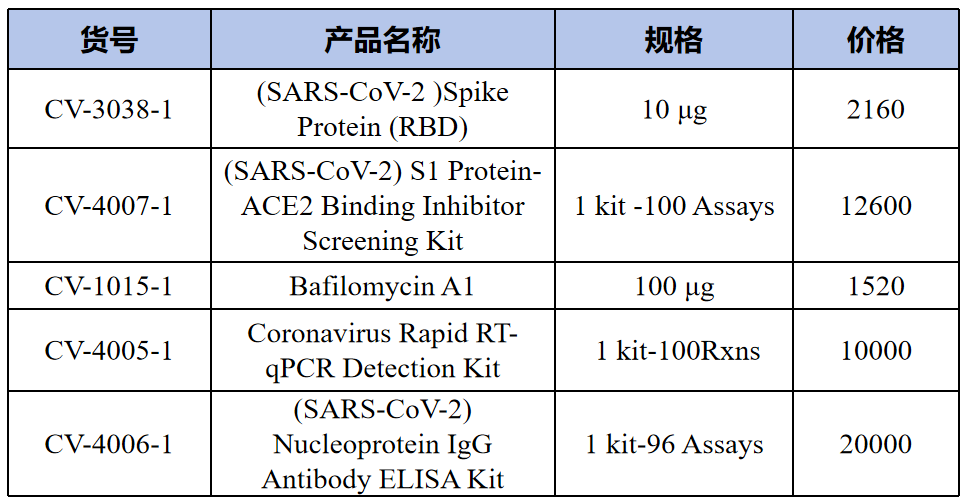
Kits(试剂盒)
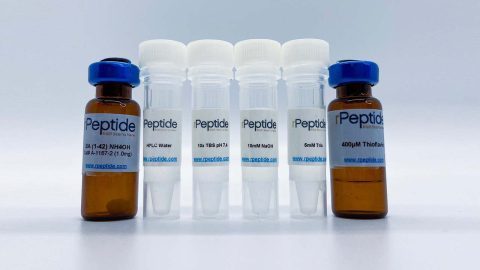
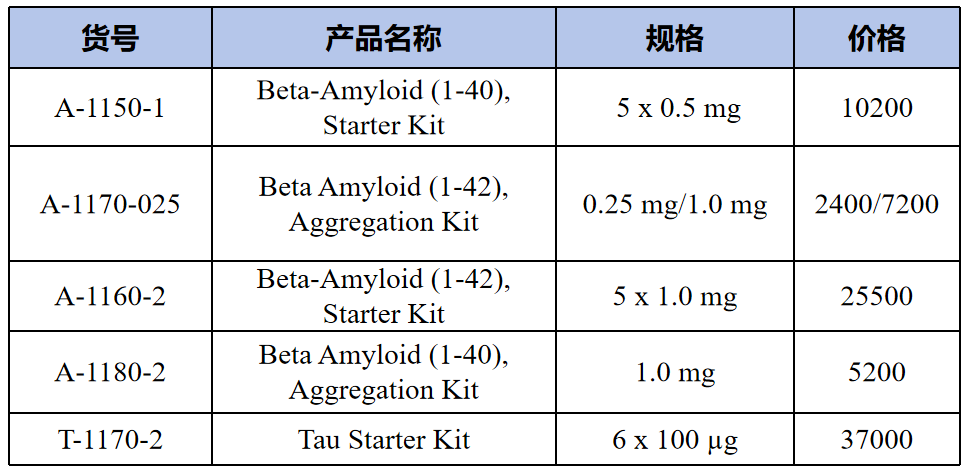
Preformed fibrils(预成型的纤维)
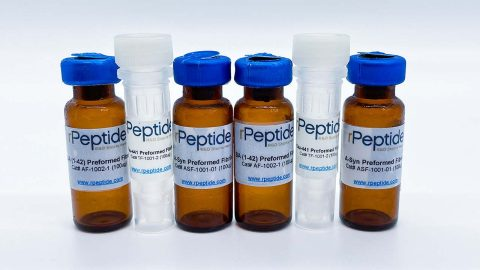

rPeptide 产品列表
Peptides
| 货号 | 名称 | 规格 | 产品描述 |
| A-1028-1 | Beta-Amyloid (1-42), Deletion | 100 µg | Beta-amyloid (A-beta) has been long reported as the major constituent of amyloid plaques in the brains of Alzheimer’s patients, and is believed by many to be the cause of Alzheimer’s Disease (AD). AD is the most common neurodegenerative disease and afflicts more than 10% of the population over 65. Recombinantly expressed and sourced from E. coli, rPeptide’s high quality beta-amyloid products offer batch-to-batch consistency and ultrapure starting material for your research needs. The HFIP (hexafluoro-isopropanol) counter-ion is a peptide which was purified before being dried with HFIP, leaving a clear dried film rather than a lyophilized powder. This counter-ion is a popular choice for researchers wishing to skip the HFIP-treatment process in their own lab while still working with a highly monomeric starting material. |
| A-1028-2 | Beta-Amyloid (1-42), Deletion | 1.0 mg | |
| AP-1156-1 | APP 669-711, HCl | 0.5 mg | Amyloid precursor protein (APP) is a membrane spanning protein that functions as the precursor to amyloid beta in plaques of Alzheimer’s disease patients. There are three major isoforms which have 695, 751, and 770 amino acids. The protein has a role in neuronal stem cell development, neuronal survival, neutrite outgrowth, and neurorepair. Recently, APP669-711 was shown to serve as a blood-based biomarker. |
| AP-1156-2 | APP 669-711, HCl | 1.0 mg | |
| AP-1153-1 | APP 669-711, HFIP | 0.5 mg | Amyloid precursor protein (APP) is a membrane spanning protein that functions as the precursor to amyloid beta in plaques of Alzheimer’s disease patients. There are three major isoforms which have 695, 751, and 770 amino acids. The protein has a role in neuronal stem cell development, neuronal survival, neutrite outgrowth, and neurorepair. Recently, APP669-711 was shown to serve as a blood-based biomarker. |
| AP-1153-2 | APP 669-711, HFIP | 1.0 mg | |
| AP-1155-1 | APP 669-711, NaOH | 0.5 mg | Amyloid precursor protein (APP) is a membrane spanning protein that functions as the precursor to amyloid beta in plaques of Alzheimer’s disease patients. There are three major isoforms which have 695, 751, and 770 amino acids. The protein has a role in neuronal stem cell development, neuronal survival, neutrite outgrowth, and neurorepair. Recently, APP669-711 was shown to serve as a blood-based biomarker. |
| AP-1155-2 | APP 669-711, NaOH | 1.0 mg | |
| AP-1157-1 | APP 669-711, NH4OH | 0.5 mg | Amyloid precursor protein (APP) is a membrane spanning protein that functions as the precursor to amyloid beta in plaques of Alzheimer’s disease patients. There are three major isoforms which have 695, 751, and 770 amino acids. The protein has a role in neuronal stem cell development, neuronal survival, neutrite outgrowth, and neurorepair. Recently, APP669-711 was shown to serve as a blood-based biomarker. |
| AP-1157-2 | APP 669-711, NH4OH | 1.0 mg | |
| AP-1001-1 | APP 669-711, TFA | 0.5 mg | Amyloid precursor protein (APP) is a membrane spanning protein that functions as the precursor to amyloid beta in plaques of Alzheimer’s disease patients. There are three major isoforms which have 695, 751, and 770 amino acids. The protein has a role in neuronal stem cell development, neuronal survival, neutrite outgrowth, and neurorepair. Recently, APP669-711 was shown to serve as a blood-based biomarker. |
| AP-1001-2 | APP 669-711, TFA | 1.0 mg | |
| A-1051-1 | Beta-Amyloid (1-11) | 1.0 mg | Beta-amyloid peptide (Abeta), the major constituent of amyloid plaques in the brains of Alzheimer’s patients, is thought to be the cause of Alzheimer’s Disease (AD). AD is the most common neurodegenerative disease and afflicts about 10% of the population over 65. Recombinantly expressed and sourced from E. coli, rPeptide’s high quality beta-amyloid products offer batch-to-batch consistency and ultrapure starting material for your research needs. The TFA (trifluoro-acetic acid) counter-ion is a peptide which was lyophilized in a final solution containing TFA and is a popular choice for researchers wishing to build on previous studies using this same product. |
| A-1051-2 | Beta-Amyloid (1-11) | 5.0 mg | |
| A-1052-1 | Beta-Amyloid (1-16) | 1.0 mg | Beta-amyloid peptide (Abeta), the major constituent of amyloid plaques in the brains of Alzheimer’s patients, is thought to be the cause of Alzheimer’s Disease (AD). AD is the most common neurodegenerative disease and afflicts about 10% of the population over 65. Recombinantly expressed and sourced from E. coli, rPeptide’s high quality beta-amyloid products offer batch-to-batch consistency and ultrapure starting material for your research needs. The TFA (trifluoro-acetic acid) counter-ion is a peptide which was lyophilized in a final solution containing TFA and is a popular choice for researchers wishing to build on previous studies using this same product. |
| A-1052-2 | Beta-Amyloid (1-16) | 5.0 mg | |
| A-1053-1 | Beta-Amyloid (1-28) | 0.5 mg | Beta-amyloid peptide (Abeta), the major constituent of amyloid plaques in the brains of Alzheimer’s patients, is thought to be the cause of Alzheimer’s Disease (AD). AD is the most common neurodegenerative disease and afflicts about 10% of the population over 65. Recombinantly expressed and sourced from E. coli, rPeptide’s high quality beta-amyloid products offer batch-to-batch consistency and ultrapure starting material for your research needs. The TFA (trifluoro-acetic acid) counter-ion is a peptide which was lyophilized in a final solution containing TFA and is a popular choice for researchers wishing to build on previous studies using this same product. |
| A-1053-2 | Beta-Amyloid (1-28) | 1.0 mg | |
| A-1055-1 | Beta-Amyloid (11-22) | 1.0 mg | Beta-amyloid peptide (Abeta), the major constituent of amyloid plaques in the brains of Alzheimer’s patients, is thought to be the cause of Alzheimer’s Disease (AD). AD is the most common neurodegenerative disease and afflicts about 10% of the population over 65. Recombinantly expressed and sourced from E. coli, rPeptide’s high quality beta-amyloid products offer batch-to-batch consistency and ultrapure starting material for your research needs. The TFA (trifluoro-acetic acid) counter-ion is a peptide which was lyophilized in a final solution containing TFA and is a popular choice for researchers wishing to build on previous studies using this same product. |
| A-1055-2 | Beta-Amyloid (11-22) | A-1055-2 | |
| A-1056-1 | Beta-Amyloid (12-28) | 0.5 mg | Beta-amyloid (A-beta) has been long reported as the major constituent of amyloid plaques in the brains of Alzheimer’s patients and is believed by many to be the cause of Alzheimer’s Disease (AD). AD is the most common neurodegenerative disease and afflicts more than 10% of the population over 65. Recombinantly expressed and sourced from E. coli, rPeptide’s high quality beta-amyloid products offer batch-to-batch consistency and ultrapure starting material for your research needs. The TFA (trifluoro-acetic acid) counter-ion is a peptide which was lyophilized in a final solution containing TFA and is a popular choice for researchers wishing to build on previous studies using this same product. |
| A-1056-2 | Beta-Amyloid (12-28) | 1.0 mg | |
| A-1057-1 | Beta-Amyloid (17-40) | 0.5 mg | Beta-amyloid (A-beta) has been long reported as the major constituent of amyloid plaques in the brains of Alzheimer’s patients and is believed by many to be the cause of Alzheimer’s Disease (AD). AD is the most common neurodegenerative disease and afflicts more than 10% of the population over 65. Recombinantly expressed and sourced from E. coli, rPeptide’s high quality beta-amyloid products offer batch-to-batch consistency and ultrapure starting material for your research needs. The TFA (trifluoro-acetic acid) counter-ion is a peptide which was lyophilized in a final solution containing TFA and is a popular choice for researchers wishing to build on previous studies using this same product. |
| A-1057-2 | Beta-Amyloid (17-40) | 1.0 mg | |
| A-1058-1 | Beta-Amyloid (17-42) | 0.5 mg | Beta-amyloid (A-beta) has been long reported as the major constituent of amyloid plaques in the brains of Alzheimer’s patients and is believed by many to be the cause of Alzheimer’s Disease (AD). AD is the most common neurodegenerative disease and afflicts more than 10% of the population over 65. Recombinantly expressed and sourced from E. coli, rPeptide’s high quality beta-amyloid products offer batch-to-batch consistency and ultrapure starting material for your research needs. The TFA (trifluoro-acetic acid) counter-ion is a peptide which was lyophilized in a final solution containing TFA and is a popular choice for researchers wishing to build on previous studies using this same product. |
| A-1058-2 | Beta-Amyloid (17-42) | 1.0 mg | |
| A-1059-1 | Beta-Amyloid (22-35) | 1.0 mg | Beta-amyloid (A-beta) has been long reported as the major constituent of amyloid plaques in the brains of Alzheimer’s patients and is believed by many to be the cause of Alzheimer’s Disease (AD). AD is the most common neurodegenerative disease and afflicts more than 10% of the population over 65. Recombinantly expressed and sourced from E. coli, rPeptide’s high quality beta-amyloid products offer batch-to-batch consistency and ultrapure starting material for your research needs. The TFA (trifluoro-acetic acid) counter-ion is a peptide which was lyophilized in a final solution containing TFA and is a popular choice for researchers wishing to build on previous studies using this same product. |
| A-1059-2 | Beta-Amyloid (22-35) | 5.0 mg | |
| A-1060-1 | Beta-Amyloid (25-35) | 1.0 mg | Beta-amyloid (A-beta) has been long reported as the major constituent of amyloid plaques in the brains of Alzheimer’s patients and is believed by many to be the cause of Alzheimer’s Disease (AD). AD is the most common neurodegenerative disease and afflicts more than 10% of the population over 65. Recombinantly expressed and sourced from E. coli, rPeptide’s high quality beta-amyloid products offer batch-to-batch consistency and ultrapure starting material for your research needs. The TFA (trifluoro-acetic acid) counter-ion is a peptide which was lyophilized in a final solution containing TFA and is a popular choice for researchers wishing to build on previous studies using this same product. |
| A-1060-2 | Beta-Amyloid (25-35) | 5.0 mg | |
| A-1061-1 | Beta-Amyloid (11-40) | 0.5 mg | Beta-amyloid peptide (A-beta), the major constituent of amyloid plaques in the brains of Alzheimer’s patients, is thought to be the cause of Alzheimer’s Disease (AD). Alzheimer’s diseased brains show significant levels of A-beta (11-40) and A-beta (11-42) 1. The ß-secretase enzyme or ß-amyloid precursor protein-cleaving enzyme (BACE) generates the N terminus of Aß, producing full-length A-beta (1-40 and 1-42) and/or truncated A-beta (11-40 and 11-42) 1. The abundance of A-beta (11-40 and 11-42) produced by BACE suggests that they might be playing an important role in Alzheimer’s disease pathogenesis. |
| A-1061-2 | Beta-Amyloid (11-40) | 1.0 mg | |
| A-1062-01 | Beta-Amyloid (11-40), Mouse,Rat | 0.1 mg | Beta-amyloid peptide (A-beta), the major constituent of amyloid plaques in the brains of Alzheimer’s patients, is thought to be the cause of Alzheimer’s Disease (AD). Alzheimer’s diseased brains show significant levels of A-beta (11-40) and A-beta (11-42) 1. The ß-secretase enzyme or ß-amyloid precursor protein-cleaving enzyme (BACE) generates the N terminus of Aß, producing full-length A-beta (1-40 and 1-42) and/or truncated A-beta (11-40 and 11-42) 1. The abundance of A-beta (11-40 and 11-42) produced by BACE suggests that they might be playing an important role in Alzheimer’s disease pathogenesis. |
| A-1062-1 | Beta-Amyloid (11-40), Mouse,Rat | 0.5 mg | |
| A-1063-1 | Beta-Amyloid (11-42), | 0.5 mg | Beta-amyloid peptide (A-beta), the major constituent of amyloid plaques in the brains of Alzheimer’s patients, is thought to be the cause of Alzheimer’s Disease (AD). Alzheimer’s diseased brains show significant levels of A-beta (11-40) and A-beta (11-42) 1. The ß-secretase enzyme or ß-amyloid precursor protein-cleaving enzyme (BACE) generates the N terminus of Aß, producing full-length A-beta (1-40 and 1-42) and/or truncated A-beta (11-40 and 11-42) 1. The abundance of A-beta (11-40 and 11-42) produced by BACE suggests that they might be playing an important role in Alzheimer’s disease pathogenesis. |
| A-1063-2 | Beta-Amyloid (11-42), | 1.0 mg | |
| A-1077-1 | Beta-Amyloid (1-37) | 0.5 mg | Beta-amyloid peptide (Abeta), the major constituent of amyloid plaques in the brains of Alzheimer’s patients, is thought to be the cause of Alzheimer’s Disease (AD). AD is the most common neurodegenerative disease and afflicts about 10% of the population over 65. Recombinantly expressed and sourced from E. coli, rPeptide’s high quality beta-amyloid products offer batch-to-batch consistency and ultrapure starting material for your research needs. The TFA (trifluoro-acetic acid) counter-ion is a peptide which was lyophilized in a final solution containing TFA and is a popular choice for researchers wishing to build on previous studies using this same product. |
| A-1077-2 | Beta-Amyloid (1-37) | 1.0 mg | |
| A-1078-1 | Beta-Amyloid (1-38) | 0.5 mg | Beta-amyloid peptide (Abeta), the major constituent of amyloid plaques in the brains of Alzheimer’s patients, is thought to be the cause of Alzheimer’s Disease (AD). AD is the most common neurodegenerative disease and afflicts about 10% of the population over 65. Recombinantly expressed and sourced from E. coli, rPeptide’s high quality beta-amyloid products offer batch-to-batch consistency and ultrapure starting material for your research needs. The TFA (trifluoro-acetic acid) counter-ion is a peptide which was lyophilized in a final solution containing TFA and is a popular choice for researchers wishing to build on previous studies using this same product. |
| A-1078-2 | Beta-Amyloid (1-38) | 1.0 mg | |
| A-1083-1 | Beta-Amyloid (1-46) | 0.1 mg | Beta-amyloid (A-beta) has been long reported as the major constituent of amyloid plaques in the brains of Alzheimer’s patients, and is believed by many to be the cause of Alzheimer’s Disease (AD). AD is the most common neurodegenerative disease and afflicts more than 10% of the population over 65. Recombinantly expressed and sourced from E. coli, rPeptide’s high quality beta-amyloid products offer batch-to-batch consistency and ultrapure starting material for your research needs. The NH4OH counter-ion is lyophilized in a basic environment, is considered more physiologically relevant to many alternatives, and may also be less toxic to cell-tissue samples. In addition, The NH4OH version of our beta-amyloid peptides is provided as a highly monomeric starting material for those wishing to study the monomeric form of the product or to aggregate the peptide in their own experiments. The NH4OH counter-ion is also the same form of the peptide that we provide in our aggregation kits. This A-beta ammonium hydroxide product can be utilized for in vitro aggregation experiments as well as cell-based assays. |
| A-1083-2 | Beta-Amyloid (1-46) | 0.5 mg | |
| A-1111-01 | Biotin Beta-Amyloid (1-40) | 0.1 mg | Biotin (N-terminus) labeled beta-amyloid peptide (Abeta). Beta-amyloid (A-beta) has been long reported as the major constituent of amyloid plaques in the brains of Alzheimer’s patients and is believed by many to be the cause of Alzheimer’s Disease (AD). AD is the most common neurodegenerative disease and afflicts more than 10% of the population over 65. Recombinantly expressed and sourced from E. coli, rPeptide’s high quality beta-amyloid products offer batch-to-batch consistency and ultrapure starting material for your research needs. The TFA (trifluoro-acetic acid) counter-ion is a peptide which was lyophilized in a final solution containing TFA and is a popular choice for researchers wishing to build on previous studies using this same product. |
| A-1111-2 | Biotin Beta-Amyloid (1-40) | 1.0 mg | |
| A-1112-1 | Biotin-LC Beta-Amyloid (1-40) | 0.5 mg | Biotin (N-terminus) labeled beta-amyloid peptide (Abeta). Beta-amyloid (A-beta) has been long reported as the major constituent of amyloid plaques in the brains of Alzheimer’s patients and is believed by many to be the cause of Alzheimer’s Disease (AD). AD is the most common neurodegenerative disease and afflicts more than 10% of the population over 65. Recombinantly expressed and sourced from E. coli, rPeptide’s high quality beta-amyloid products offer batch-to-batch consistency and ultrapure starting material for your research needs. The TFA (trifluoro-acetic acid) counter-ion is a peptide which was lyophilized in a final solution containing TFA and is a popular choice for researchers wishing to build on previous studies using this same product. |
| A-1112-2 | Biotin-LC Beta-Amyloid (1-40) | 1.0 mg | |
| A-1113-1 | Fluorescein Beta-Amyloid (1-40) | 0.5 mg | Fluorescein labeled beta-amyloid peptide (Abeta). Beta-amyloid (A-beta) has been long reported as the major constituent of amyloid plaques in the brains of Alzheimer’s patients and is believed by many to be the cause of Alzheimer’s Disease (AD). AD is the most common neurodegenerative disease and afflicts more than 10% of the population over 65. Recombinantly expressed and sourced from E. coli, rPeptide’s high quality beta-amyloid products offer batch-to-batch consistency and ultrapure starting material for your research needs. The TFA (trifluoro-acetic acid) counter-ion is a peptide which was lyophilized in a final solution containing TFA and is a popular choice for researchers wishing to build on previous studies using this same product. |
| A-1117-1 | Biotin Beta-Amyloid (1-42) | 0.5 mg | Biotin (N-terminus) labeled beta-amyloid peptide (Abeta). Beta-amyloid (A-beta) has been long reported as the major constituent of amyloid plaques in the brains of Alzheimer’s patients and is believed by many to be the cause of Alzheimer’s Disease (AD). AD is the most common neurodegenerative disease and afflicts more than 10% of the population over 65. Recombinantly expressed and sourced from E. coli, rPeptide’s high quality beta-amyloid products offer batch-to-batch consistency and ultrapure starting material for your research needs. The TFA (trifluoro-acetic acid) counter-ion is a peptide which was lyophilized in a final solution containing TFA and is a popular choice for researchers wishing to build on previous studies using this same product. |
| A-1117-2 | Biotin Beta-Amyloid (1-42) | 1.0 mg | |
| A-1118-1 | Biotin-LC Beta-Amyloid (1-42) | 0.5 mg | Biotin-LC (N-terminus) labeled beta-amyloid peptide (Abeta), (*Linker Chain) Labeled (*6 carbon linker – amino hexanoic acid). Beta-amyloid (A-beta) has been long reported as the major constituent of amyloid plaques in the brains of Alzheimer’s patients and is believed by many to be the cause of Alzheimer’s Disease (AD). AD is the most common neurodegenerative disease and afflicts more than 10% of the population over 65. Recombinantly expressed and sourced from E. coli, rPeptide’s high quality beta-amyloid products offer batch-to-batch consistency and ultrapure starting material for your research needs. The TFA (trifluoro-acetic acid) counter-ion is a peptide which was lyophilized in a final solution containing TFA and is a popular choice for researchers wishing to build on previous studies using this same product. |
| A-1119-1 | Fluorescein Beta-Amyloid (1-42) | 0.5 mg | Fluorescein labeled Beta-amyloid peptide (Abeta). Abeta is the major constituent of amyloid plaques in the brains of Alzheimer’s patients, and is thought to be the cause of Alzheimer’s Disease (AD). AD is the most common neurodegenerative disease and afflicts about 10% of the population over 60. |
| A-1119-2 | Fluorescein Beta-Amyloid (1-42) | 1.0 mg | |
| A-1119r-1 | Fluorescein-r Beta-Amyloid (1-42) | 0.5 mg | Human beta-amyloid (1-42) has been covalently labeled with Fluorescein Isothiocyante and assayed for fluorescence. The FITC label has a maximum absorbance at 495 and a maximum emission at 525nm. This FITC labeled form of recombinant beta-amyloid (1-42) is ideally suited to localization experiments, aggregation monitoring, and binding kinetics without the need for mutations or further labeling. This product may be applicable to in vitro or in vivo studies monitoring aggregation, binding, or cellular uptake and trafficking 1. The addition of the FITC allows for monitoring through microscopy of fluorescence spectroscopy 2 with both live cells and lipid models. Oligomer formation, fibril formation, or other structural assembly could also be attempted |
| A-1119r-2 | Fluorescein-r Beta-Amyloid (1-42) | 1.0 mg | |
| A-1120-2 | N15 Beta-Amyloid (11-42), Uniformly Labeled | 1.0 mg | N15 uniformly labeled beta-amyloid peptide (A-beta). Beta-amyloid peptide (A-beta), the major constituent of amyloid plaques in the brains of Alzheimer’s patients, is thought to be the cause of Alzheimer’s Disease (AD). Alzheimer’s diseased brains show significant levels of A-beta (11-40) and A-beta (11-42) 1. The ß-secretase enzyme or ß-amyloid precursor protein-cleaving enzyme (BACE) generates the N terminus of Aß, producing full-length A-beta (1-40 and 1-42) and/or truncated A-beta (11-40 and 11-42) 1. The abundance of A-beta (11-40 and 11-42) produced by BACE suggests that they might be playing an important role in Alzheimer’s disease pathogenesis. |
| A-1131-1 | N15 Beta-Amyloid (1-40), Mouse, Rat, Uniformly Labeled | 0.5 mg | N15 uniformly labeled beta-amyloid peptide (A-beta). A-beta is the major constituent of amyloid plaques in the brains of Alzheimer’s patients, and is thought to be the cause of Alzheimer’s Disease (AD). AD is the most common neurodegenerative disease and afflicts about 10% of the population over 60. |
| A-1134-1 | N15 Beta-Amyloid (1-42), Mouse, Rat, Uniformly Labeled | 0.1 mg | |
| A-1134-2 | N15 Beta-Amyloid (1-42), Mouse, Rat, Uniformly Labeled | 1.0 mg | |
| A-1137-1 | N15 Beta-Amyloid (11-40), Uniformly Labeled | 1.0 mg | N15 uniformly labeled beta-amyloid peptide (A-beta). Beta-amyloid peptide (A-beta), the major constituent of amyloid plaques in the brains of Alzheimer’s patients, is thought to be the cause of Alzheimer’s Disease (AD). Alzheimer’s diseased brains show significant levels of A-beta (11-40) and A-beta (11-42) 1. The ß-secretase enzyme or ß-amyloid precursor protein-cleaving enzyme (BACE) generates the N terminus of Aß, producing full-length A-beta (1-40 and 1-42) and/or truncated A-beta (11-40 and 11-42) 1. The abundance of A-beta (11-40 and 11-42) produced by BACE suggests that they might be playing an important role in Alzheimer’s disease pathogenesis. |
| A-1140-1 | N15 Beta-Amyloid (11-40), Rat, Uniformly Labeled | 1.0 mg | |
| AP-1101-1 | N15 APP 669-711, Uniformly Labeled | 0.5 mg | Amyloid precursor protein (APP) is a membrane spanning protein that functions as the precursor to amyloid beta in plaques of Alzheimer’s disease patients. There are three major isoforms which have 695, 751, and 770 amino acids. The protein has a role in neuronal stem cell development, neuronal survival, neutrite outgrowth, and neurorepair 1. Recently, APP669-711 was shown to serve as a blood-based biomarker 2. This product has been uniformly labeled with N15. |
| AP-1101-2 | N15 APP 669-711, Uniformly Labeled | 1.0 mg | |
| A-1147-1 | N15 Beta-Amyloid (1-38), Uniformly Labeled | 0.1 mg | N15 uniformly labeled beta-amyloid peptide (A-beta). A-beta is the major constituent of amyloid plaques in the brains of Alzheimer’s patients, and is thought to be the cause of Alzheimer’s Disease (AD). AD is the most common neurodegenerative disease and afflicts about 10% of the population over 60. |
| A-1147-2 | N15 Beta-Amyloid (1-38), Uniformly Labeled | 1.0 mg | |
| A-1179-1 | N15 Beta-Amyloid (1-46), Uniformly Labeled | 0.1 mg | N15 uniformly labeled beta-amyloid peptide (A-beta). A-beta is the major constituent of amyloid plaques in the brains of Alzheimer’s patients, and is thought to be the cause of Alzheimer’s Disease (AD). AD is the most common neurodegenerative disease and afflicts about 10% of the population over 60. |
| A-1179-2 | N15 Beta-Amyloid (1-46), Uniformly Labeled | 0.5 mg |
联系我们
相关推荐
评论列表共有 0 条评论
暂无评论
发表评论
取消回复
药科美专注生命科学产品进出口与技术服务





